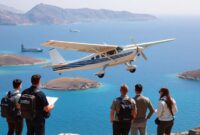Chathams are home to some of the most stunning yet isolated islands in New Zealand, and Air Chathams plays a vital role in bridging the gap between these remote areas and the mainland. By learning how to navigate their services, you can unlock new opportunities for travel and connection while supporting the communities that thrive there. Discover how this airline not only transports you to beautiful locations but also actively contributes to building brighter futures for residents through sustainable practices and reliable travel options.
How to Understand Air Chathams’ Operations
As you explore Air Chathams, you will gain insights into how this airline operates with a steadfast commitment to connecting remote islands in New Zealand. Their focus on providing reliable, safe, and efficient air travel services reflects their understanding of the unique needs of the communities they serve.
Essential Fleet and Equipment
To ensure safe and reliable travel, Air Chathams utilizes a well-maintained fleet of aircraft tailored for short-haul operations. Their equipment choices emphasize both comfort and efficiency, catering to the specific demands of regional air travel.
Route Network and Destinations
Any traveler interested in Air Chathams will appreciate the variety of routes and destinations offered, designed to enhance connectivity for remote communities. Their comprehensive network facilitates easy access to both popular tourist spots and less-traveled islands.
For instance, Air Chathams connects major hubs like Auckland to remote destinations such as Chatham Islands and Whanganui, giving you the opportunity to explore New Zealand’s hidden gems. This network fosters a sense of community and provides crucial services, significantly improving local economies and reducing travel times for residents. With Air Chathams, your journey becomes not just a trip but an avenue for growth and opportunity.
Key Factors in Remote Aviation Success
Any successful remote aviation operation relies on several key factors. These include:
- Safety measures
- Weather management skills
- Community engagement
- Efficient logistics
Thou must understand that integrating these elements is important for building a reliable and sustainable air transport network.
Safety Standards and Compliance
There’s no room for error when it comes to safety in remote aviation. Adhering to stringent regulatory standards ensures that every flight operates under the highest safety measures. Compliance with these regulations not only safeguards passengers but also enhances your airline’s credibility and trustworthiness in the community.
Weather Management Protocols
If you are navigating remote aviation, understanding weather patterns is vital. Weather management protocols allow you to anticipate and respond effectively to changing conditions, ensuring safe flights.
Standards for weather management are designed to keep flights safe by providing guidelines on monitoring and responding to severe weather conditions. You should be aware that strong winds, heavy precipitation, and fog can significantly impact flight schedules and safety. Using advanced forecasting tools and training your team to interpret weather data equips you with the knowledge to make informed decisions. This proactive approach can result in reduced delays and increased passenger confidence.
Tips for Sustainable Island Air Service
It is important to implement best practices for sustainable air service in remote islands to ensure environmental integrity and community wellbeing. Consider the following strategies:
- Utilize fuel-efficient aircraft to reduce greenhouse gas emissions.
- Engage with local communities for feedback on their transportation needs.
- Promote eco-friendly tourism to create awareness and support conservation.
- Implement carbon offset programs for travelers.
Recognizing the unique environmental challenges of island communities can help foster a more resilient, sustainable future.
Community Partnership Strategies
For an effective approach, you should focus on establishing strong relationships with community stakeholders. Engage local businesses, tourism operators, and residents to understand their needs and expectations from air services. Collaborating with these groups enhances destination promotion and ensures that you can effectively adapt your operations to the specific culture and environmental concerns of the islands.
Economic Viability Measures
Sustainable air services must prioritize economic stability to remain operational. You can achieve this by evaluating routes based on passenger demand, adjusting schedules to align with peak travel seasons, and exploring partnerships with local tourism bodies to increase visitor numbers. By focusing on affordability and accessibility, you can create a more stable revenue stream while ensuring the service remains viable for residents and travelers alike.
Economic sustainability is imperative for the success of any air service in remote islands. By systematically analyzing your operational costs and revenues, you can identify areas for improvement. Offering competitive fares without compromising safety or service quality is important. Fostering partnerships with local businesses can stimulate tourism growth, bolstering your operations while benefiting the island community. Furthermore, investing in technology upgrades to improve efficiency can significantly reduce overall costs. You must continuously adapt your business model to the ever-changing market dynamics of island travel to thrive in this unique industry.
Remote Island Transportation Challenges
Many remote islands face unique transportation challenges that can hinder connectivity and accessibility. Whether it’s due to limited flight schedules or unpredictable weather conditions, these challenges can restrict your ability to travel, affecting not just individuals but also local businesses and economies. To effectively address these obstacles, innovative solutions and partnerships, like those fostered by Air Chathams, are crucial in creating reliable transport links to sustain island communities.
Infrastructure Limitations
If you’re considering travel to a remote island, be aware that infrastructure limitations can present significant hurdles. Many of these islands lack well-developed roads, ports, or even consistent power supplies, which can complicate the logistics of transportation and delivery. Without adequate infrastructure, your travel experience may involve delays or restrictions, impacting both personal mobility and goods transportation.
Resource Management
For island communities, effective resource management is vital to maintaining transportation systems and ensuring sustainability. Limited natural resources mean that careful planning must be in place to balance environmental needs with the demand for reliable transport. Disruptions in resource availability can lead to increased costs and inconsistent service, putting pressure on both residents and visitors.
Resource management on remote islands involves careful consideration of sustainable practices to ensure that both community needs and environmental health are prioritized. Your travel choices may depend on the ability of local services to maintain crucial resources such as fuel, water, and food supplies. Striking the right balance allows islands to flourish while providing you with a seamless travel experience. The goal is to build a robust framework that enhances your journey while safeguarding the island’s resources for future generations.
Operational Excellence Guidelines
Now, operational excellence is at the heart of Air Chathams’ mission to connect remote islands and build bright futures. These guidelines embrace best practices that ensure safety, efficiency, and reliability in every aspect of your operations, from the moment you book a flight to the time you step off at your destination. By adhering to these standards, you contribute to a seamless travel experience that supports the communities served by Air Chathams.
Crew Training Requirements
Clearly, the foundation of exceptional service begins with well-trained crew members. Your crew undergoes extensive training that encompasses safety protocols, customer service skills, and operational procedures. This commitment ensures that each member is equipped with the knowledge and skills needed to provide a safe and welcoming journey for all passengers.
Maintenance Best Practices
Clearly, adhering to maintenance best practices is vital for ensuring the safety and reliability of your aircraft. Regular inspections and thorough maintenance activities are important components that help prevent issues before they arise.
A systematized approach to aircraft maintenance is non-negotiable. By implementing a rigorous schedule of preventive checks, you can detect potential issues early, reducing the risk of unexpected failures during operations. Additionally, maintaining a strong relationship with certified service providers ensures that all repairs are performed to the highest standards. Prioritizing corrective actions, along with documenting each procedure, enhances both safety and efficiency for Air Chathams. This approach not only safeguards your aircraft but also fosters trust among passengers and contributes to the overall success of the airline.
Future Development Roadmap
All signs indicate a promising future for Air Chathams as it continues to expand its reach and enhance services. The development roadmap outlines strategic initiatives aimed at boosting connectivity, improving customer experiences, and fostering sustainable practices. You can expect to see significant investments that will transform travel experiences, connecting remote islands while building a brighter future for both the airline and the communities it serves.
Fleet Expansion Plans
Roadmap plans include adding new aircraft to the fleet, aiming to increase capacity and flight frequency on popular routes. This expansion is designed to meet the growing demand for travel between your cherished destinations and ensure that your journeys are comfortable and efficient.
Service Enhancement Initiatives
Fleet improvements are just the beginning; Air Chathams is committed to enhancing the overall travel experience. You will notice upgrades in onboard services, streamlined booking processes, and improved customer support. These enhancements aim to ensure that your travel experience is not only seamless but also enjoyable, putting your needs at the forefront of the service.
Initiatives designed to enhance your experience will focus on implementing state-of-the-art technology for smooth check-ins and more flexible booking options. The airline will provide upgraded in-flight services, allowing you to enjoy greater comfort and efficiency. Moreover, Air Chathams plans to prioritize safety measures, ensuring your travel is not just pleasant but also secure. By investing in these enhancements, Air Chathams aims to foster a customer-centric environment, guaranteeing that your journeys are memorable and enjoyable.
Final Words
With these considerations, you can appreciate how Air Chathams serves as a vital link between remote islands, helping to foster economic growth and community connections. By providing reliable air travel options, you empower your local businesses and promote tourism while ensuring that imperative services reach those in isolated areas. Air Chathams not only enhances transportation accessibility but also paves the way for brighter futures for island residents, making it an indispensable part of New Zealand’s aviation landscape.
FAQ
Q: What services does Air Chathams provide for connecting remote islands?
A: Air Chathams specializes in air travel services that connect the Chatham Islands with mainland New Zealand and other surrounding destinations. By offering regular scheduled flights, charter services, and customized travel solutions, they ensure that residents and visitors can easily access these remote islands. They also provide cargo services, enabling necessary supplies and goods to be transported efficiently, thus supporting the local economy and community needs.
Q: How does Air Chathams support the local communities on the Chatham Islands?
A: Air Chathams actively contributes to the well-being of local communities by enhancing connectivity and facilitating trade and tourism. By operating flights that cater to tourism, the airline helps promote local attractions, resulting in economic growth for the community. Additionally, Air Chathams engages in various community initiatives and partnerships that focus on sustainability and promoting the rich cultural heritage of the islands.
Q: What amenities can passengers expect when flying with Air Chathams?
A: Passengers traveling with Air Chathams can expect a comfortable flying experience with a range of amenities designed to enhance their journey. The airline offers a relaxed cabin atmosphere, friendly and attentive service, and complimentary snacks and beverages on most flights. For those needing assistance, staff are trained to accommodate various requirements, ensuring that every passenger has a pleasant experience from check-in to arrival.



